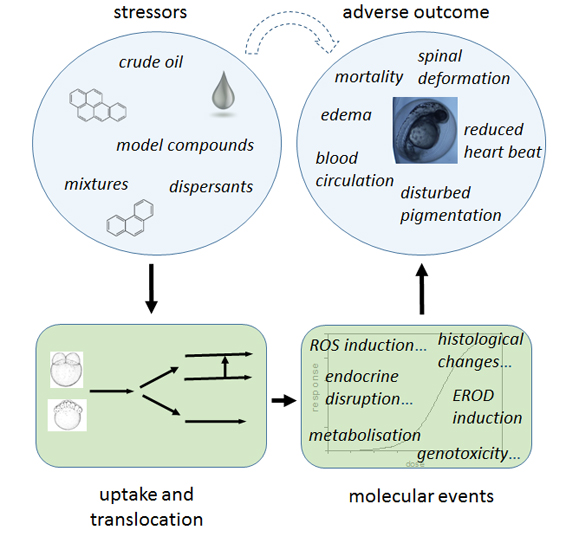
Picture of the adverse impacts of oil in a zebrafish. © Thomas-Benjamin Seiler
Objective: The objective of WP3 is to improve the knowledge on the biological impacts of oil spills and the different oil spill response methods in the northern Atlantic and the Baltic Sea, characterized by extreme environmental conditions. This is achieved by examining the adverse outcome links in ecologically relevant target species at a regional scale and the zebrafish as a well investigated vertebrate model. We define these links as causative relations of molecular events with adverse outcomes on organ or organism level, which are in contrast to AOPs species and/or contamination specific and do not cover the complete pathway from the molecular event to the adverse outcome, but rather just link the initial event to the observable effect. However, where possible we will further aim at developing complete adverse outcome pathways for understanding the entire process of toxicity by oil constituents in local species of the study areas. This approach will result in monitoring and environmental hazard and risk assessment strategies covering a wide range of bioeffect-based tools useful for oil spill and oil spill response impacts in these particular regions.
Planned steps
- Ggaining of science-based knowledge on the effects of oil contamination on biota in the Baltic Sea and the northern Atlantic as a pre-requisite for effective oil spill response;
- Deriving a set of effect-based tools for easy and cost-effective monitoring and for rapid remediation assessment;
- Establishing species-specific adverse outcome links for a set of ecologically relevant species from the study regions (bivalves, fish, crustaceans) and for laboratory models (zebrafish) for assessing the relevant effects of oil contamination and impacts of response actions in cold water with a reference to temperate areas; and
- Providing biomarker data on effects on key invertebrate species in the coastal zone.
Work package leader:
Assistant professor, Dr. Thomas-Benjamin Seiler
Institute for Environmental Research
RWTH Aachen University
seiler@bio5.rwth-aachen.de